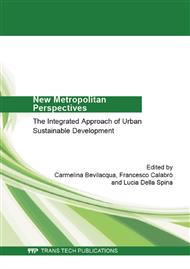[1]
B. J., Pine and J.H. Gilmore: The Experience Economy. Work is Theatre & Every Business a Stage, Harvard Business School Press, Boston, Massachusetts (1999).
DOI: 10.1016/s0737-6782(01)00088-1
Google Scholar
[2]
B. H. Schmitt: Experiential Marketing, Free Press, New York (1999).
Google Scholar
[3]
R. Resciniti: Il marketing orientato all'esperienza. L'intrattenimento nella relazione con il consumatore, Edizioni Scientifiche Italiane, Napoli (2004).
Google Scholar
[4]
S. H. Tsaur, Y. T. Chiu and C.H. Wang: The visitors behavioral consequences of experiential marketing. In: Journal of Travel and Tourism Marketing, vol. 21, n. 1 (2007), pp.47-64.
DOI: 10.1300/j073v21n01_04
Google Scholar
[5]
V. W. S. Tung and J. R. B. Ritchie: Exploring the essence of memorable tourism experiences. In: Annals of Tourism Research, Vol. 38, n. 4 (2011), pp.1367-1386.
DOI: 10.1016/j.annals.2011.03.009
Google Scholar
[6]
J. R. B. Ritchie, V.W.S. Tung and R.J.B. Ritchie: Tourism experience management research: Emergence, evolution and future directions. In: International Journal of Contemporary Hospitality Management, vol. 23, n. 4: (2011), p.419 – 438.
DOI: 10.1108/09596111111129968
Google Scholar
[7]
J. H. Kim, J. R. B. Ritchie and B. McCormick: Development of a scale to measure memorable tourism experiences. In: Journal of Travel Research, vol. 10, n. 10, (2011), pp.1-14.
Google Scholar
[8]
E. C. Hirschman and M.B. Holbrook: Hedonic consumption: emerging concepts, methods and propositions. In: Journal of Marketing, vol. 46, n. 2, (1982), pp.92-101.
DOI: 10.1177/002224298204600314
Google Scholar
[9]
G. Fabris: Il nuovo consumatore: verso il post-moderno, Franco Angeli, Milano (2003).
Google Scholar
[10]
A. Carù and B. Cova. (2003). Esperienza di consumo e marketing esperienziale: radici diverse e convergenze possibili. In: Micro & Macro Marketing, vol. 12, (2003), pp.187-211.
Google Scholar
[11]
R. Resciniti and G. Maggiore (Eds): (2009), Event experience. Progettare e gestire eventi da ricordare, Edizioni Scientifiche Italiane, Napoli (2008).
Google Scholar
[12]
G. Maggiore and R. Resciniti: La prospettiva dei partecipanti: il modello dell'event experience. in Il valore degli eventi, edited by E. Bonetti, S. Cherubini, G. Iasevoli, and R. Resciniti, Franco Angeli, (2009), pp.133-158.
Google Scholar
[13]
G. Maggiore and R. Resciniti: Experiential marketing for value creation in cultural heritage management. In: Advances in tourism studies, edited by A. Morvillo, The McGraw-Hill Companies, Milano (2012), pp.261-280.
Google Scholar
[14]
P. Buonincontri and G. Maggiore: Costruire esperienze memorabili. Il caso dei Sassi di Matera, in: XVIII Rapporto sul Turismo Italiano 2011-12, edited by E. Becheri and G. Maggiore, Franco Angeli, Milano (2013), pp.317-330.
Google Scholar
[15]
E. Arnould, L. Price and G. Zinkhan: Consumers, 2nd ed., McGraw-Hill/Irwin, New York. (2004).
Google Scholar
[16]
B. H. Schmitt. and A. Simonson: Marketing aesthetics: The strategic management of brands, identity, and image, New York, Free Press (1997).
Google Scholar
[17]
C. K. Prahalad and V. Ramaswamy: The Future of Competition: Co-Creating Unique Value with Customers, Harvard Business School Press, Boston (2004).
DOI: 10.5465/ame.2004.13835520
Google Scholar
[18]
D. MacCannell: The Tourist: a new theory of the leisure class, Schocken Books, New York (1989).
Google Scholar
[19]
D. LaSalle and T.A. Britton: Priceless: turning ordinary products, into extraordinary experiences, Harvard Business School Press, Boston (2003).
Google Scholar


